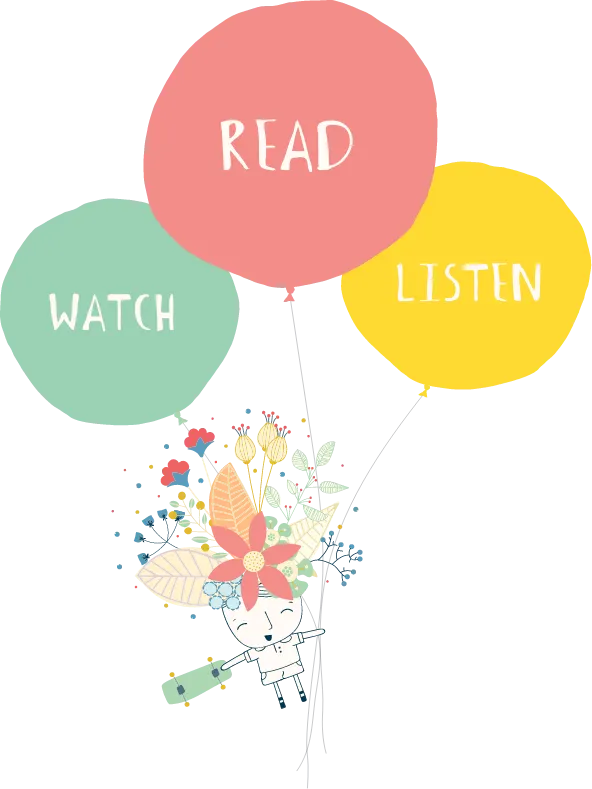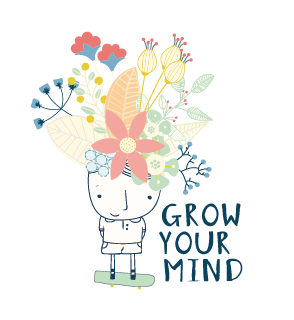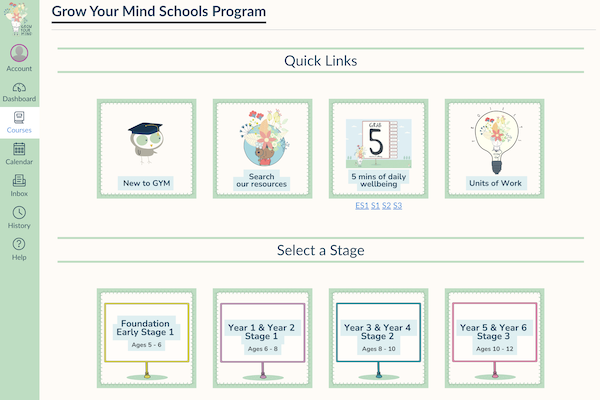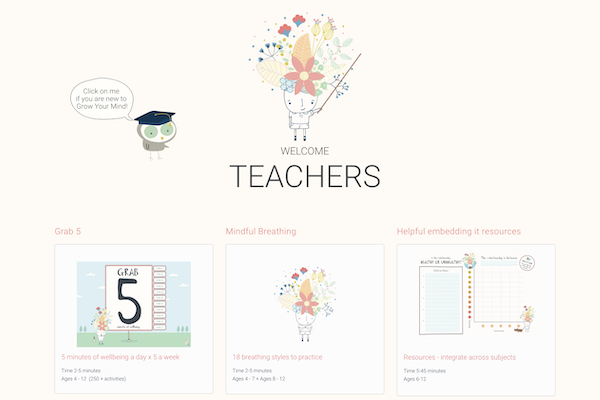We are big on Research
Our educational content has been created by an NSW accredited teacher with a Masters in International Public Health
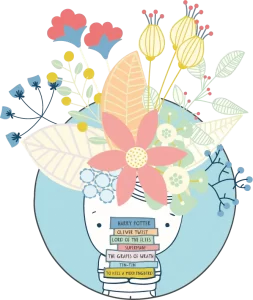
Pedagogy
Grow Your Mind uses a blended learning approach to allow for a broad range of learners and teachers to access the content, ideas and strategies. We have created resources that incorporate explicit, collaborative, play-based and digital learning.

In 2021 an external evaluation of the Grow Your Mind schools program was completed by the Psychology Department at The University of Wollongong. The results were very compelling and highlighted students who had access to the Grow Your Mind program showed the following:
– reduction in negative affect,
– positive gains in physical and psychological wellbeing
– quality of the child’s interactions with others, sense of connection, belonging and engagement.
To read a summary of the evaluation project results please click here.
The full evaluation report can be found here.
Some of the (MANY) key researcher and leaders who have inspired Grow Your Mind:
MARTIN SELIGMAN, PENN UNIVERSITY
Martin Seligman is the founder of modern day positive psychology (the scientific study of what enables individuals and communities to flourish). He is the recognised authority on interventions that prevent depression, build strengths and wellbeing.
Grow Your Mind in particular focuses on:
OPTIMISM: Seligman states that optimism can be a learned behaviour and should be a priority for children, in order to build resilience, prevent poor mental health and extend life. At Grow Your Mind we have created the concept of shark and dolphin thinking as a playful way to teach optimism and pessimism. From a young age we aim to teach children that not all thoughts are facts and that some thoughts can be helpful and others can be unhelpful.
GRATITUDE: Seligman has highlighted that gratitude is a powerful technique to practice in order to boost long term happiness, in fact it is the key ingredient in all long term studies on people who feel happy for extended periods of their life. It is also a big component of building optimism. Seligman refers to fascinating research on these topics.He has also written numerous books and carried out his own studies in this area. At Grow Your Mind we provide every day suggestions for practising gratitude in an authentic way. The strategies we suggest vary from journals, reflection questions, meditation and highlighting children’s literature that supports the practice.
DR BARBARA FREDRICKSON, NORTH CAROLINA
Barbara Fredrickson has completed numerous studies on broadening emotions and their impact on our emotional and physical health. In particular she has focused on what joy, kindness, love and gratitude do to our mental health. At Grow Your Mind we created the Flip to Flourish which has over 60 invitations for ways we can flourish. We also developed the Take Care of Your Mind poster with lessons to highlight every day habits we can grow to increase positive emotions. The Grow Your Mind podcast consists of 7 episodes that highlight the importance of positive emotions. We developed the DOSE poster, each letter stands for a different neurotransmitter with examples of ways your brain can release these. We have multiple student reflection journals as well as bite sized video lessons on these topics for teachers and students to use.
Dr Lucy Hone
Lucy Hone, Ph.D., is thought leader in the field of resilience psychology. Author of Resilient Grieving: Finding Strength and Embracing Life After a Loss that Changes Everything and the TED talk 3 Secrets of Resilient People, one of the Top 20 TED talks of 2020. Dr Hone’s work has inspired us to create podcast episodes, a song about resilience, and posters that showcase the myths and facts about this not-so-elusive trait.
VIA INSTITUTE OF CHARACTER
In the early 2000s Scientists discovered a common language of 24 character strengths. These are the qualities that come most naturally to you. Every individual possesses all 24 character strengths in different degrees, giving each person a unique character strength profile. When you know your strengths, you can improve your life and thrive. Everyone possesses all 24 character strengths in different degrees, so each person has a truly unique character strengths profile. At Grow Your Mind we created the character strengths posters, discussion pointers for explaining strengths and other values in a child friendly way, lesson plans, reflection journals and a Guess Who video series to playfully teach what character strengths are.
DR DAN SIEGEL
Siegel turns leading brain science into simple and effective solutions to nurture children’s wellbeing and boost mental health. In one of his books, The Whole-Brain Child (co-authored with Dr Bryson) , Siegel offers powerful research based tools for helping children develop emotional intelligence. Siegel explains how the brain works and promotes the idea that giving very young children self-understanding can lead to a greater ability to make good choices and ultimately a more meaningful and joyful life. One strategy the authors share is for adults to understand the concept of the “upstairs” and “downstairs” brain which uses the analogy of a two-story house to illustrate aspects of kids’ brains. The downstairs brain includes lower regions of the brain that are responsible for basic functions (like breathing and blinking) as well as impulses and emotions (like anger and fear). Siegel’s analogy of ‘Flipping the lid’ is another helpful example of understanding the brain and emotional regulation.
Grow Your Mind created animal characters to playfully teach key parts of the brain. Using stories and animal analogies to teach complex subject matter has been done throughout time. We created these animals and our story to introduce the basics of neuroscience in an engaging way for young and old.We developed posters displaying each animal, an animation, student reflection journals and our podcast integrates the animals into each episode.
The above is only the beginning! Our resources have been influenced by
many researchers, psychologists and teachers. We are continually energised by organisations, podcasts, books, Ted Talks, blogs, websites & journal articles. Here is again a small snapshot of these:
DR TAL BEN-SHAHAR
Books on happiness + dangers of perfectionism
DR JOHN MEDINA
DR SARAH MCKAY
KAREN REIVICH, PENN UNIVERSITY
DR ROBERT EMMONS
BENEFIT MINDSET
DR KRISTY GOODWIN
Resilience + digital wellbeing
THE RESILIENCE PROJECT
Gratitude, Empathy + Mindfulness
SHELLY FAN
The mechanism linking exercise to BDNF
DR ANDREW FULLER
DR SONJA LYUBOMIRSKY
DR Brené Brown
The power of vulnerability Ted Talk
KAREN YOUNG
Anxiety, resilience and brain health
RICHARD LOUV
ANGELA DUCKWORTH
Self-Discipline Outdoes IQ in Predicting Academic Performance of Adolescents
DAPHNE M. DAVIS, PHD, AND JEFFREY A. HAYES, PHDJULY/AUGUST 2012, VOL 43, NO. 7
What are the benefits of mindfulness
Adam Grant
Dr Becky Kennedy
DR CAROL DWECK
Ted Talk on mindset – *We believe a growth mindset only works when we have safe classrooms, supportive homes, and space to fail well.
JANE DUTTON
MIHALY CSIKSZENTMIHALYI
MIND UP
Empowering children through mindful practice based in neuroscience
SMILING MIND
Equipping young people with the integral skills they need to thrive in life
BOUNCE BACK
NORMAN DOIDGE
TONI NOBLE & HELEN MCGRATH
The PROSPER school pathways for student wellbeing, policy and practices
JACOLYN NORRISH
Positive Education. The Geelong Grammar School Journey
DR. VIVEK H. MURTHY
HARVARD MEDICAL SCHOOL
Giving Thanks Can Make you happier
DR LEA WATERS
GREGORY BRATMAN
Stanford News nature and mental health
MICHAEL V. BARATTA
ROBERT R. ROZESKE
STEVEN F. MAIER (EDS)
Understanding stress and resilience
DR RUSS HARRIS
ERIC HAGERMAN DR JOHN J. RATEY
Spark!: How exercise will improve the performance of your brain
CENTRE ON THE SOCIAL AND EMOTIONAL FOUNDATIONS FOR EARLY LEARNING
Fostering Emotional Literacy in Young Children: Labelling Emotions
Dacher Keltner
Movement – large cross-sectional study on movement and mental health
DR KEN ROBINSON
Schools and creativity Ted Talk
DR ILONA BONIWELL
Positive Psychology in a nutshell
DR JULIA BAIRD
MATTHEW WALKER
Why We Sleep: The New Science of Sleep and Dreams
DR VANESSA LAPOINTE
DR MARIA SIROIS
FELICE JAKA
DR GEORGE VAILLANT
HOARE, E., BOTT, D., & ROBINSON, J. (2017).
ZELAZO, P. D., & LYONS, K. E. (2012)
GOUDA, S., LUONG, M. T., SCHMIDT, S., & BAUER, J. (2016).
COSTELLO, E., & LAWLER, M. (2014)
JOURNAL OF HAPPINESS STUDIES
Letters of Gratitude: Further evidence for author benefits
Harvard Longitudinal study on happiness
Julianne Holt-Lunstad
Yumi Stynes and Melissa Kang
Kristen Neff
